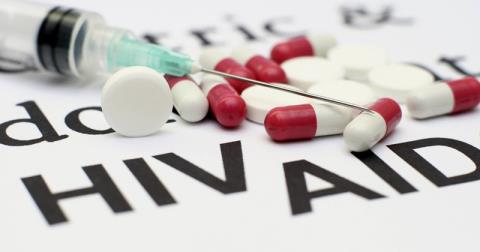ARV - HIV medicine and useful information to know

HIV medications (ARVs) are a group of different drugs that have reverse transcriptase and can stop the growth of HIV. Currently, the drug is widely used both in the treatment of people living with HIV and in the prevention of HIV infection.
Since its inception, ARV has been the drug of choice in HIV treatment centers for HIV patients. See details about this HIV drug below!
Introduction to HIV (ARV) drugs
Antiretroviral drugs (ARV - means HIV antiretroviral drugs ) are a group of different antiretroviral drugs that are able to stop the growth of HIV. Currently, the drug is widely used both in the treatment of people living with HIV and in the prevention of HIV infection.
ARVs prevent viral replication by keeping the virus levels in the blood as low as possible. When a person is infected with HIV, the virus weakens the immune system. Therefore, if treated with ARV drugs, it is possible to prevent the virus from multiplying and proliferating. It protects the immune system and allows infected people to lead a normal life like everyone else.
 ARVs prevent viral replication
ARVs prevent viral replication
Most people living with HIV on ART are healthy, work, study, have happy families and have normal healthy children.
Researchers have shown that a person with HIV who is on antiretroviral (ARV) treatment and has an undetectable viral load in their blood is at increased risk of contracting HIV through sex. Insignificant here is understood as follows: Too small or unimportant, insignificant or unimportant.
An undetectable viral load was defined as less than 200 copies per milliliter of blood. This means that a person with HIV receiving antiretroviral therapy when their viral load is below the detectable threshold protects both the health of people living with HIV and prevents the spread of HIV to sexual partners.
Types of ARV
Some HIV medications include:
- Non-nucleoside reverse transcriptase (NNRTI).
- Nucleoside reverse transcriptase (NRTI).
- protease inhibitors (PIs).
- CCR5 antagonists.
- Integral chain transfer inhibitors (INSTIs).
- Fusion inhibitor.
The doctor will prescribe the right medication and combination of drugs for each case. For HIV medicine to be effective, it must be taken exactly as prescribed, without skipping doses.
Subjects using ARV
When a patient is on antiretroviral therapy, physicians must consider the patient's clinical stage and CD4 cell count. According to the Ministry of Health's guidance on HIV diagnosis and treatment, ART is indicated when a CD4 test is available if:
- Patients with HIV clinical stage 4 (with symptoms such as: weight loss of more than 10% of body weight) and fever; persists for more than 1 month or has unexplained diarrhea; pneumonia , chronic herpes infection of lips, mouth, genitals...; esophageal candidiasis ...) regardless of CD4 cell count.
- Stage 3 HIV infection (unexplained weight loss greater than 10% of body weight, unexplained diarrhea lasting more than 1 month; unexplained fever intermittently or continuously for more than 1 month); recurrent oral thrush...) CD4 and 350TB/mm3.
- People with HIV clinical stage 1 and 2, CD4 and <250 cells="" cells/mm3.="" field="" suitable="" not considered="" test="" can="" cd4 then= "" only="" defined="" thing="" value="" arv="" when="" infected="" hiv="" at="" stage="" paragraph="" clinical="" clinical="" 3,="">
The doctor will prescribe the right medication and combination of drugs for each case
Side effects when using ARV
While taking HIV medication, patients may experience side effects caused by the medication. Some common side effects are:
- Nausea: To limit this side effect, the patient can take the drug with or right after a meal or take an anti-emetic 30 minutes before taking the ARV.
- Diarrhea: If the patient has diarrhea after taking the drug, the degree of diarrhea and accompanying symptoms must be assessed. During diarrhea, Oresol should be taken to rehydrate and electrolytes. In severe cases, fluids or anti-diarrheal drugs may be needed to control diarrhea.
- Headache: If the patient has a headache while taking the drug, it is possible to use common pain relievers such as paracetamol to relieve the headache.
- Abdominal pain, abdominal pain: due to this phenomenon the patient must be carefully monitored. In case of persistent pain, you must go to the medical facility where the drug is provided for treatment, or even change to another drug or change HIV medicine.
- Itchy rash: Like other HIV medications, ARVs can cause allergies. Mild rash, scattered red, itchy... Fix: take more antihistamines. However, if a serious allergic reaction is potentially life-threatening, the drug should be stopped immediately and intensive treatment should be instituted at a qualified medical center.
 While taking HIV medicines, patients may experience side effects caused by the drugs
While taking HIV medicines, patients may experience side effects caused by the drugs
- Anemia : Some ARV drugs have the effect of suppressing bone marrow, causing the bone marrow to reduce its ability to produce red blood cells, causing anemia with symptoms such as dizziness and lightheadedness. Usually occurs after 4-6 weeks or may appear after several months of HIV treatment with antiretroviral drugs. To overcome this situation, you can add vitamin B12, iron tablets, folic acid....
- Sleep disorders, frequent nightmares: patients with this symptom should take the drug at night before going to bed. These symptoms usually do not last long. You can use sedatives to help you sleep better.
- Peripheral neuropathy: Patients often have peripheral sensory disturbances, mainly in the extremities with numbness, burning or pain. If it is severe, it will make it difficult for the patient to walk and cause loss of sensation in many places. Usually occurs after 6 months of HIV treatment. Vitamin B can be used in large doses, severe cases must be changed.
In addition, the drug can be toxic to the liver, kidneys, fat distribution disorder (including increased fat accumulation in the chest, abdomen, back, neck; atrophy of fatty tissue in the arms, legs, buttocks, cheeks). ...). Because antiretroviral drugs have many side effects, if during the course of taking the drug appear abnormal symptoms, the patient must immediately notify the HIV doctor for appropriate treatment.
To prevent harmful interactions and ensure that the medicine is effective, it is important for people with HIV to discuss with their doctor about other treatments or supplements they are taking.